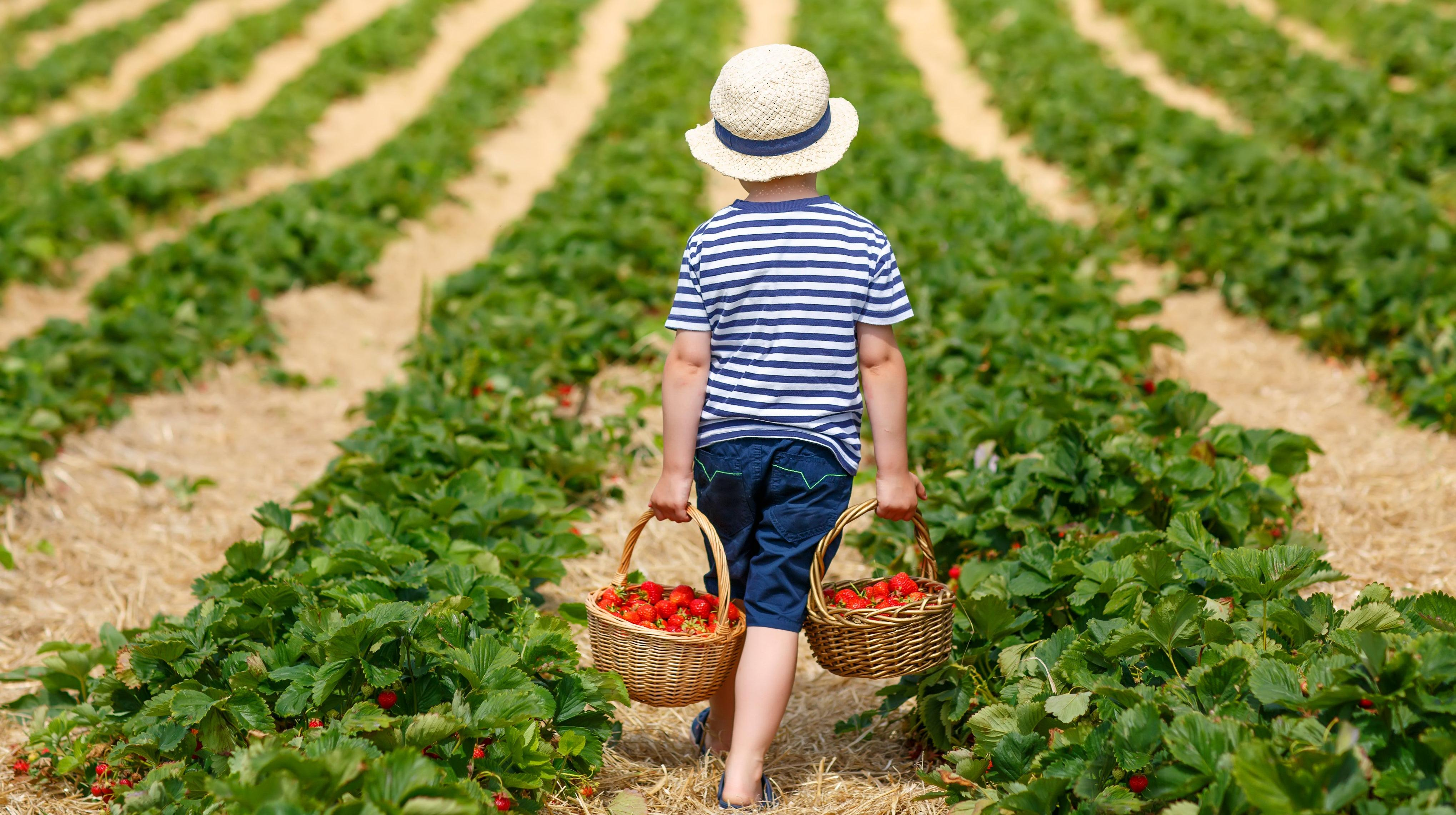How U-Pick Farms Benefit Everyone
Yes, there are reasons some would want their farm to be overrun by children eating their crops.
Berry season is upon us and farmer's markets and road-side stands are full of delicious jewel-toned treasures. The "what do we do with these unschooled hooligans" season is also upon us and one of the many activities that comes across the parenting newsletters is "U-Pick" farms.
What is a U-Pick farm and why do we do it?
The premise, if you have somehow been spared, is that you show up, tell whoever is running the farm how many buckets you want, and then go into the field and pick as many berries, apples, flowers, trees, or whatever they're selling as you can carry.
You try not to get sunstroke or impaled by thorns in the process and you take very cute pictures of your children or girlfriend wearing a straw hat. Back at the farm store, they weigh your spoils. You go home and make pie or jam or crumbles or what have you and feel very domestic and American.
You can "U-Pick" all kinds of things year-round: flowers, the ever-Instagrammable pumpkins, and of course, you can cut your own Christmas tree at a farm. But in the summertime when I turn into a red potato person and get big mad at the world, the question that came to my mind is: Why oh why would any farmer in their right mind want to allow children and their exhausted parents to roam their fields, picking their produce, usually eating it as they go, despite the signs?
Surely we untrained civilians must ruin the fields. We can't possibly be as efficient as machines or professional pickers. Do they make enough money upcharging the flats or in the farm stores attached to the fields to make it worth it? Not all of them have "agrotourism" attractions like hayrides or games, so do they make money only on the berries?
And when did this become a thing, anyway?
A brief history of U-Pick farms
I grew up reading Blueberries for Sal by Robert McCloskey, wherein a plucky little kid and a curious baby bear accidentally switch places while picking wild blueberries. However, the sanctioned "activity" of "pick your own" at farms has been around since medieval times, and had a resurgence as a fun thing to do with your family in the 1950s.
Pesky Rachel Carson ruined everything when she informed people that eating pesticides might not be good for them, so the fun was squashed until farmers started using more poison-free methods more recently, going green as we know it today.
With the resurgence of clean eating and whole foods, eating locally and farm-to-table, picking your own food has become one of those morally superior activities that nice families do and brag about, like gardening. Field trips to farms abound every spring and, yes, I have sent my kid to camp at a farm.
Ways that U-Pick farms benefit the farmers
According to farmers and researchers, pick-your-own farming is worth it for the farmer if the product is worth less than paying laborers to pick it for you, which can change with the market or depending on the product. They lay out many crops that are good candidates for U-Pick.
"Labor is increasingly hard to find these days, as well as getting more expensive," says Troy Wojtaszek, owner and operator of Clement Blueberry Farm in New Jersey. "There are other alternatives such as machine harvesting, but you cannot get the quality of hand picking and these machines cost quite a bit of money as well. You might not be able to make as much money at first with a u-pick as you could by harvesting and selling, however if you build a large enough customer base you can get close." He says he enjoys getting to interact with the public and does make additional profit from selling products in the shop.
Other factors that make or break a business include the proximity to a public that wants to engage in this agrotourism. Where I live, Portland, Oregon, is technically a city, albeit a fairly suburban one. But travel about 20 to 30 minutes in any direction and you are in farmland. Every fall we have our pick of pumpkin patches within a 30-minute drive. In the summer, we have berry and peach farms. In the winter we never have to drive more than 45 minutes to get a good Christmas tree.
In the years I've lived here, the competition between these places has grown, and what used to be a simple, "show up and pick your pumpkin" farm now has carnival games, rides, a playground, a restaurant, and more. What was a $10 day out as a family has skyrocketed to a full day outing and a huge cash cow for the farm.
Ways that U-Pick farms benefit the consumer
So, here I am complaining that my family had "too much fun" at the farm, but also that I had to basically spend amusement park prices for some blueberries that my daughter suddenly decided she no longer likes and that my son ate so much of he had blue poop for a week.
The original intention of the U-Pick farm—that the farmer gets free labor from the consumer and the consumer gets the berries at a fair, weight-based price plus the extras they stole while picking—does seem like a nice day out in the sunshine with your family. If the farmer does make a profit from that model, based on the tricky balance of location, product to labor costs, and the opportunity for extra profits without too many overhead costs, then everyone does in fact, win.
And, if I am feeling really cranky about it, sure, I can just go to the farmer's market. You can take good Instagram pictures at the farmer's market, too.
